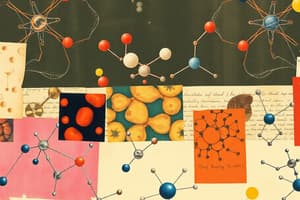Podcast
Questions and Answers
What is the primary function of carbohydrates in cells?
What is the primary function of carbohydrates in cells?
- To regulate cellular processes
- To provide structure and support for cells
- To provide energy and structure for cells (correct)
- To transmit genetic information
Which biomolecule contains genetic information and transmits it from one generation to the next?
Which biomolecule contains genetic information and transmits it from one generation to the next?
- Proteins
- Nucleic Acids (correct)
- Lipids
- Amino Acids
What is the primary function of proteins in cells?
What is the primary function of proteins in cells?
- To transmit genetic information
- To provide energy for cells
- To perform a wide range of functions, including enzymatic, structural, and transport roles (correct)
- To provide structure and support for cells
Which biomolecule is responsible for transporting molecules and ions across cell membranes?
Which biomolecule is responsible for transporting molecules and ions across cell membranes?
What is the primary function of lipids in cells?
What is the primary function of lipids in cells?
What is the primary function of amino acids in cells?
What is the primary function of amino acids in cells?
Flashcards are hidden until you start studying
Study Notes
Definition
- A biomolecule is a type of molecule that is present in living organisms
- Biomolecules are the building blocks of life and perform a wide range of functions necessary for life
Types of Biomolecules
- Carbohydrates: provide energy and structure for cells
- Examples: sugars, starches, cellulose
- Proteins: perform a wide range of functions, including enzymatic, structural, and transport roles
- Examples: enzymes, hormones, collagen
- Lipids: provide energy and structure for cells
- Examples: fats, oils, cholesterol
- Nucleic Acids: contain genetic information and transmit it from one generation to the next
- Examples: DNA, RNA
- Amino Acids: building blocks of proteins
- Examples: glycine, alanine, serine
Functions of Biomolecules
- Energy production and storage: carbohydrates, lipids, and proteins provide energy for cells
- Structural roles: proteins, carbohydrates, and lipids provide structure and support for cells
- Regulatory roles: proteins, hormones, and neurotransmitters regulate cellular processes
- Transport roles: proteins and lipids transport molecules and ions across cell membranes
- Information storage and transmission: nucleic acids contain genetic information and transmit it from one generation to the next
Biomolecules
- Biomolecules are molecules present in living organisms, serving as building blocks of life and performing essential functions.
Types of Biomolecules
- Carbohydrates: provide energy and structure for cells, examples include sugars, starches, and cellulose.
- Proteins: perform various functions such as enzymatic, structural, and transport roles, examples include enzymes, hormones, and collagen.
- Lipids: provide energy and structure for cells, examples include fats, oils, and cholesterol.
- Nucleic Acids: contain genetic information and transmit it from one generation to the next, examples include DNA and RNA.
- Amino Acids: building blocks of proteins, examples include glycine, alanine, and serine.
Functions of Biomolecules
Energy and Structure
- Biomolecules provide energy for cells through carbohydrates, lipids, and proteins.
- Biomolecules provide structure and support for cells through proteins, carbohydrates, and lipids.
Regulation and Transport
- Biomolecules regulate cellular processes through proteins, hormones, and neurotransmitters.
- Biomolecules transport molecules and ions across cell membranes through proteins and lipids.
Information Storage and Transmission
- Nucleic acids contain genetic information and transmit it from one generation to the next.
Studying That Suits You
Use AI to generate personalized quizzes and flashcards to suit your learning preferences.




